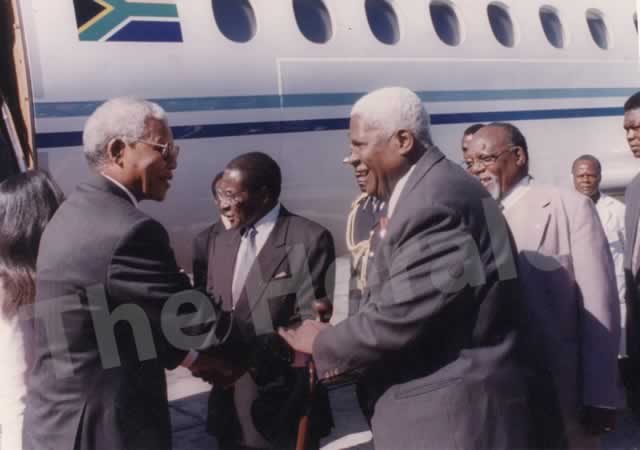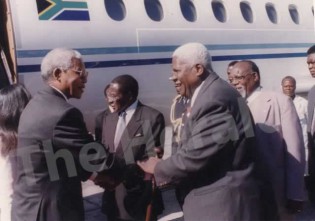Editorial Comment: Mandela: The next logical stage


The late cde Nelson Mandela greets the late Vice President Joshua Nkomo at the Harare International Airport soon after his arrival in 1997. In the background are President Mugabe and the late Vice President Cde Simon Muzenda.
When the day came it almost looked like a form of release for a media that had for months been obsessed with Nelson Mandela’s mortality.
There had been a media frenzy around Mandela’s health, and judging by the manner in which the obituaries flowed forth, there can be no doubt that Madiba’s epitaphs were written many weeks ago.
It’s sick, but it’s the world we live in: A world that has commodified just about everything, including news and death — and especially news of death.
In the midst of the orgy, little real attention has been paid to the real Mandela story, and that story is on what his legacy is.
It is likely that this is a story that generations to come will have immense interest in, using their benefit of hindsight to dissect our sorry contemporary attempts at telling the Mandela story.
Why should we interrogate his legacy, some may ask. After all, he is a South African and he is South Africa’s hero to mourn and celebrate.
However, he has been made more than a South African. He is a global icon and an African legend.
And as such we have the right to raise questions on whether or not he is our hero or someone else’s, and what it means when Africans are literally given heroes by the very same people who colonised them not too many years ago.
Naturally, opinion will be divided over how good Mandela has been to South Africa and indeed to Africa in the years after he shared a Nobel Peace Prize with the last apartheid leader, FW De Klerk.
On one hand we know that Mandela averted much bloodshed in South Africa. It was good for South Africa. Enough people had died (one death is always one more than enough) and people — in particular the poor blacks — just wanted to “move on”.
But move on they didn’t. And move Africa did not. It was and is a heavy price for the whole of Africa, more so for those in Southern Africa who sacrificed much to see the ANC get to the politically important moment of 1994.
South Africa was supposed to provide the economic, social and military leadership that Africa so desperately needed to move forward with dignity.
That did not happen. Without in any way disparaging the very tough experiences that Mandela went through, and thereafter the invaluable support South Africa rendered to many countries, including Zimbabwe, in many difficult situations, there remains that nagging feeling that this economic powerhouse can be so much more than it is today.
South Africa’s scope for leadership has been horribly limited by the fact that all of us as Africans have allowed Mandela to be adopted as a hero by his own oppressors.
A straitjacket definition of what a “model” leader is has been created for us and many of us are desperately trying to fit into this mould — often to the detriment of our own people.
Many of Africa’s leaders are mightily trying to become Mandelas. They dare not push economic independence, they dare not confront injustices perpetrated on our continent by the West.
Being confrontational, we have been made to believe, is not the “Mandela way”. The easy temptation is to blame Mandela for this ideological and practical stagnation by leaders who want to become mini Mandelas. But the truth is Madiba is not to blame.
Mandela played his part.
He opted for the reconciliation path after apartheid and it is up to his successors to deal with the major matters of economic empowerment and social justice.
It is up to Africa’s present leaders to take the struggle to its next logical stage — ensuring that Africans are masters of their own resources and destiny.
It is what the Mandela of the Rivonia trial would have wanted. It is what the people of Africa today demand.









Comments